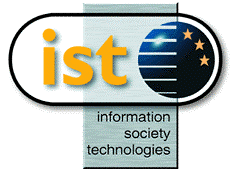
EU funded R&D Project IST-2000-27524
SILC - Supporting Independently Living Citizens SILC Project Home page
Objectives
The Project SILC aims at the development of an innovative and intelligent
alarm system to increase safety and independence of elderly and disabled
citizens. In contrast to existing alarm phones SILC will be equipped with
a range of biometric sensors which can be programmed individually to trigger
an alarm call automatically when a critical situation is detected.
In order to increase the user benefit beyond the alarm function several
additional utilities like a cordless phone, environmental control functionality
and PDA like functions combined with an intuitive user interface will be
integrated to facilitate safe and independent living at home.
In general, SILC will foster and facilitate a prolonged stay of senior
citizens in the own household before institutional care will become necessary.
Description of the Work
The project is grouped into three main phases:
The first phase (PrM 1 to 9) is dedicated to the analysis and transfer
of the user needs to the system architecture specifications.The milestone
for this phase is the completion of the system specifications (end of month
9).
The second phase (PrM 8 to 24) is the construction period where all the system components (Hardware, Software) will be developed. The first part of this phase is dedicated to the development of the single modules which will be tested against the specifications: system kernel, telecommunication, sensors, user interface. During the final 6 months of this phase the modules will be integrated resulting in the prototype of the SILC-System. The milestone for this phase is a first prototype to be tested by real users.
The third phase (PrM 25 to 36) contains the usual development cycle of testing, redesign/improvement and subsequent testing. Within the project one such cycle will be carried out. Workpackage 11 will take care of the verification, the second task of Workpackage 11 will be dedicated to the redesign, and user validation will be performed in Workpackage 12. Additional redesign and testing will be carried out by the exploiting partners between the end of the project and the start of production and marketing if necessary. Parallel to the three phases, Management (WP1), Exploitation (WP2) and Dissemination (WP3) will take place to guarantee optimal co-operation and timely provision of results as well as continuous focus on the market.
Further on, user involvement (WP4) across all phases of the project as a separate, permanent task has been created. This workpackage includes the analysis and the assessment of user requirements and expectations, influencing specifications and system design, verification and validation of the prototypes. Quality Assurance and analysis of ethical impacts is another task of WP4.
Contact point
fortec / Research Group for Rehabilitation Technology
Mr. Wolfgang Zagler
Favoritenstrasse 11/029
A-1040 Vienna
Austria
Tel.: +43 1 58801 42911
Fax: +43 1 58801 42999
Email: silc-fortec@fortec.tuwien.ac.at
Participants
| Participant names | Participant short name | Country | Status* |
| fortec – Research Group for Rehabilitation Technology |
|
|
C |
| TECWINGS Industrialisierung und Elektronikproduktion GmbH |
|
|
P |
| Cardionetics Limited |
|
|
A |
| Ajuntament de Callús |
|
|
A |
| Joanneum Research Forschungsgesellschaft mbH, Institute of Noninvasive Diagnostics | JOA | A | P |
| Regione Veneto, Direzione Servizi Sociali | VEN | I | P |
| CHCVITAE, S.A. | CHC | E | A |
| Municipality of Vienna | VIE | A | A |
| Johanniter-Unfall-Hilfe in Österreich | JUH | A | A |
| Cloudworld Limited | CLW | UK | A |
| Knowsley Metropolitan Borough Council | KNO | UK | A |
| Tesan | TES | I | S |
*C = Coordinator
P - Principal contractor
A - Assistant contractor
S - Subcontractor
Start date: January 2001
Duration: 36 months